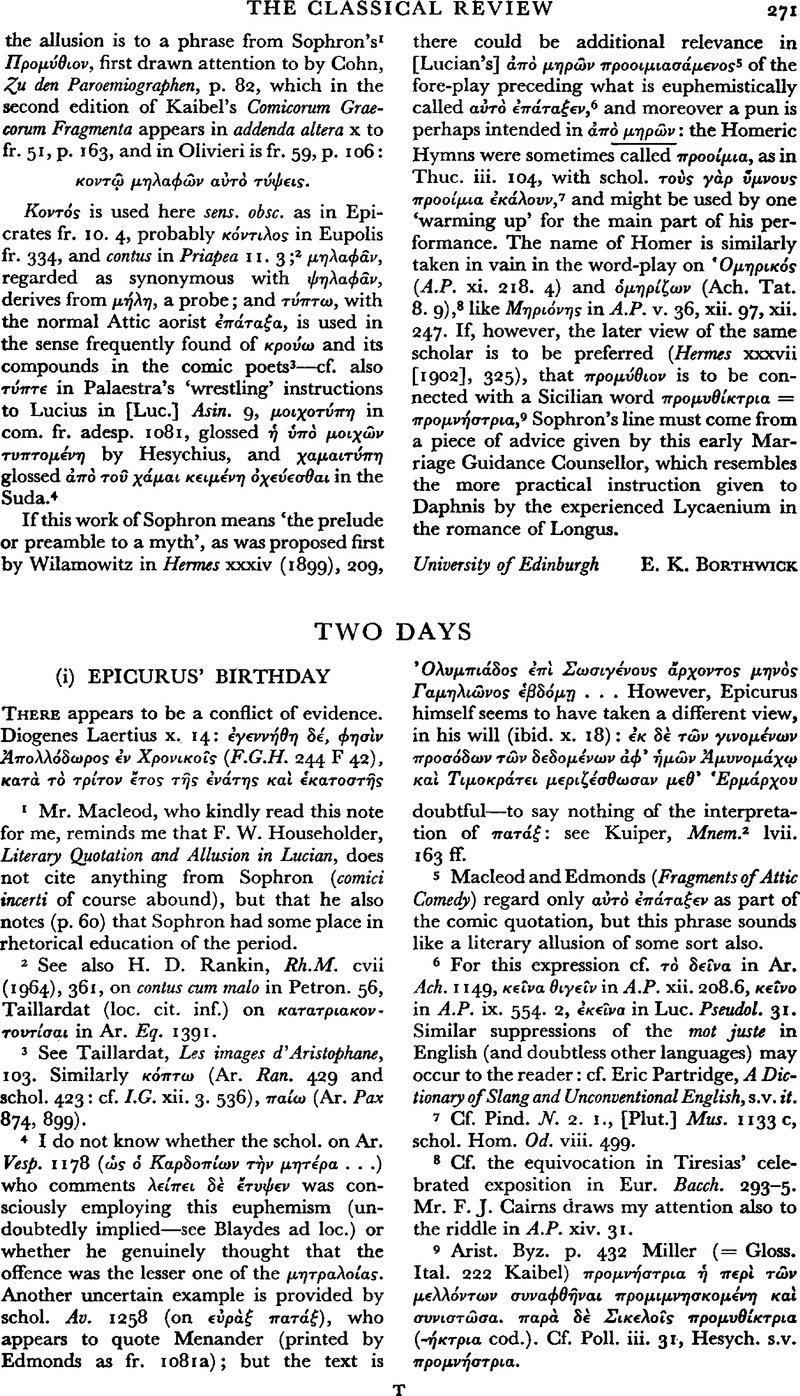No CrossRef data available.
Article contents
Two Days
Published online by Cambridge University Press: 27 February 2009
Abstract

- Type
- Review Article
- Information
- Copyright
- Copyright © The Classical Association 1969
References
1 Mr. Macleod, who kindly read this note for me, reminds me that F. W. Householder, Literary Quotation and Allusion in Lucian, does not cite anything from Sophron (comici incerti of course abound), but that he also notes (p. 60) that Sophron had some place in rhetorical education of the period.
2 See also H. D. Rankin, Rh.M. cvii (1964), 361, on contus cum malo in Petron. 56, Taillardat (loc. cit. inf.) on κατατριακοντοντ⋯σαι in Ar. Eq. 1391.
3 See Taillardat, , Les images d'Aristophane, 103Google Scholar. Similarly κ⋯πτω (Ar. Ran. 429 and schol. 423: cf. I.G. xii. 3. 536), πα⋯ω (Ar. Pax 874. 899).
4 I do not know whether the schol. on Ar. Vesp. 1178 (ὡς ⋯ Καρδοπ⋯ων τ⋯ν μητ⋯ρα …) who comments λε⋯πει δ⋯ ἔτυψεν was consciously employing this euphemism (undoubtedly implied—see Blaydes ad loc.) or whether he genuinely thought that the offence was the lesser one of the μητραλο⋯ας. Another uncertain example is provided by schol. Av. 1258 (on εὐρ⋯ξ πατ⋯ξ), who appears to quote Menander (printed by Edmonds as fr. 1081a); but the text is doubtful—to say nothing of the interpretation of πατ⋯ξ: see Kuiper, Mnem.2 lvii. 163 ff.
5 Macleod and Edmonds (Fragments of Attic Comedy) regard only αὐτ⋯ ⋯π⋯ταξν as part of the comic quotation, but this phrase sounds like a literary allusion of some sort also.
6 For this expression cf. τ⋯ δεῖνα in Ar. Ach. 1149, κενα θιγεῖν in A.P. xii. 208.6, κεῖο in A.P. ix. 554. 2, ⋯κεῖα in Luc. Pseudol. 31. Similar suppressions of the mot juste in English (and doubtless other languages) may occur to the reader: cf. Eric Partridge, A Dictionary of Slang and Unconventional English, s.v. it.
7 Cf. Pind. N. 2. 1., [Plut.] Mus. 1133 c, schol. Hom. Od. viii. 499.
8 Cf. the equivocation in Tiresias' celebrated exposition in Eur. Bacch. 293–5. Mr. F. J. Cairns draws my attention also to the riddle in A.P. xiv. 31.
9 Arist. Byz. p. 432 Miller (= Gloss. Ital. 222 Kaibel) προμν⋯στρια ⋯ περτ⋯ν μελλ⋯ντων συναφθ⋯ναι προμιμνησκομ⋯νη κα⋯ συνιστ⋯σα. παρ⋯ δ⋯ Σικελοῖς προμυθ⋯κτρια (-⋯κτρια cod.). Cf. Poll. iii. 31, Hesych. s.v. προμν⋯οτρια.


